News
Tackling gender discrimination …Give boys, girls equal opportunity to thrive

Boys and girls deserve an equal opportunity to thrive
Every girl and boy deserves an equal chance to survive and thrive, yet gender discrimination, continues to rob them of their childhood and limit their potentials.
The United Nations Economic and Social Commission for Western Asia (UNESCWA) defines gender discrimination as any distinction, exclusion or restriction made on the basis of sex which has the effect or purpose of impairing or nullifying the recognition, enjoyment or exercise by women, irrespective of their marital status, on the basis of equality of men and women, of human rights and fundamental freedoms in the political, economic, social, cultural, civil or any other field.
Gender discrimination has the tendency to deny girls their rights, kept from school, forced to marry and subjected to violence while her voice is undervalued. This assault on childhood also deprives nations of the energy and talent they need to progress.
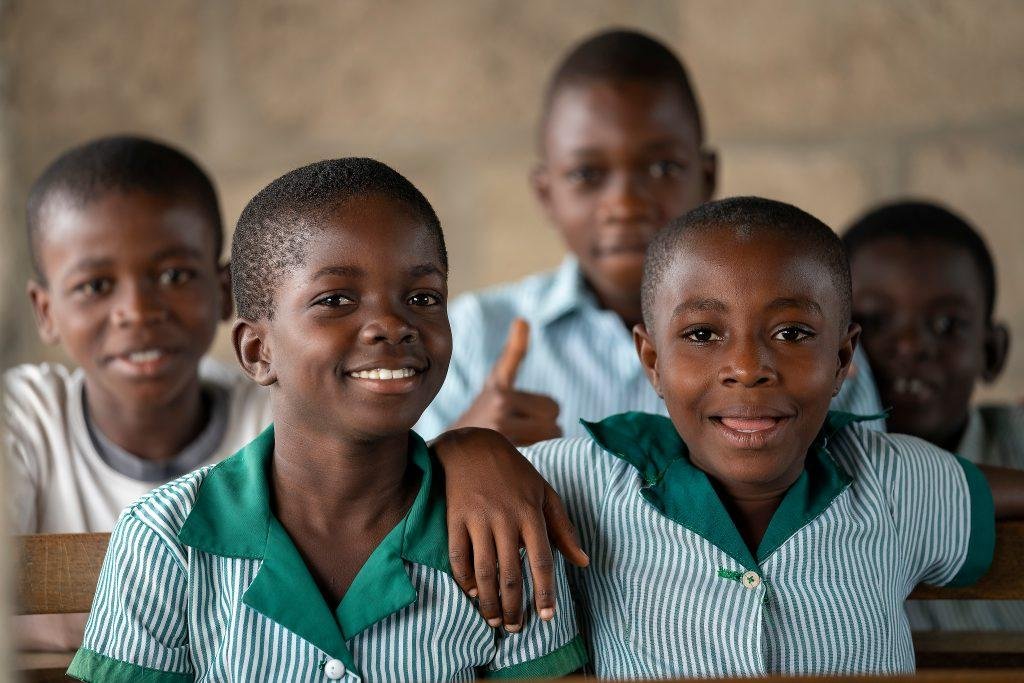
According to the United Nations Children’s Fund (UNICEF), boys also suffer from gender norms. Notions of masculinity can fuel child labour, gang violence and recruitment into armed groups. No matter where it prevails, or how it manifests, gender inequality harms every member of society.
An International Organisation, Save the Children says, it will take over 200 years to achieve gender equality, and that is just in the United States of America (USA).
The organisation therefore describes as unacceptable, adding that together, we can create a more equal world, right from the start.
What are the causes of gender discrimination?
Gender discrimination begins from childhood. From the moment girls and boys are born, they face unequal gender norms as well as social norms regarding expectations and access to resources and opportunities in their homes, schools and communities.
For example, girls are most often made to carry or do household chores with the notion of preparing them for future marriage, pregnancy and caring for their children while the boys are often encouraged to go to school and get an education to prepare for work.
This tendency often leads to child marriage and pregnancy among girls.
Effects of gender discrimination
In Ghana, gender discrimination among boys and girls exposes them to the possibility of child marriage, teenage pregnancy, child domestic work, poor education and health, sexual abuse, exploitation and violence.
Girls are more likely than their male counterparts to drop out of school, marry at an early age, and experience challenges in their sexual and reproductive health and rights. They are also more likely to be exposed to violence and exploited in child labour.
Way Forward
Gender equality is a basic right for all people, including both girls and boys, it is therefore critical for Ghana to directly address gender discrimination in order to ensure that no harm comes to children while ensuring that every child attains their equal right to grow up healthily, educated and safe.
Gender equality is essential to close the inequality gaps including those who are most vulnerable.
To build a more equal, inclusive future, free from gender discrimination, Ghana needs to start in childhood.
Also according to Ghanaians Against Child Abuse (GACA), a social drive campaign for the protection of children and also aimed at reducing violence, abuse, neglect and exploitation of children, gender inequalities were drivers of many child protection violations.
They begin with boys’ and girls’ socialisation in the family, school or community which encourages them to follow specific cultural norms and roles deemed appropriate for their gender.
The gendered socialisation can mean that girls are expected to do more domestic work, not get as much or as quality schooling as boys, to marry younger, be less mobile, or tolerate physical and sexual abuse.
Conversely, it can mean that boys are expected to be more aggressive, violent, mobile, unruly and responsible for and capable of making money, having a job, etc.
GACA said it is the role of families, schools and communities to ensure boys and girls grow up with more gender equitable roles and practices, and achieve gender equitable outcomes in protection, safety and life opportunities.
According to UNICEF, Gender equality means that girls and boys enjoy the same rights, resources, opportunities and protections. In 2021, UNICEF ushered in a new gender policy (2021–2030) articulating its vision for gender equality in its programmes, as well as at workplaces and practices, around the globe.
The Gender Action Plan (2022– 2025) charts UNICEF’s way forward with a series of time-bound results that deliver lasting, transformative change for children, adolescents and women worldwide.
UNICEF and other international organisations are working with partners in Ghana on a variety of educational initiatives including the development of gender-responsive school curricula; gender training for education professionals to help eliminate gender discrimination.
Conclusion
Tackling gender discrimination in boys and girls is a collective responsibility for all Ghanaians. It is therefore important for individuals, organisations and governments to take deliberate steps to achieve gender equality for all irrespective of one’s gende
By Jemima Esinam Kuatsinu
News
Avonsige: The intersection of fashion and culture

As I speak to Avonsige Ayinemi Augustina, the visionary CEO and Creative Director of AVONSIGE, she passionately shares her journey with me.
Her voice carries both confidence and warmth, mirroring the essence of her designs yet deeply rooted in culture.
“Fashion for me, is more than just clothing,” she told me. “It is a language, a way of expressing identity, and a bridge that connects our past, present, and future. Every piece I create tells a story, and that story begins with Ghana.”
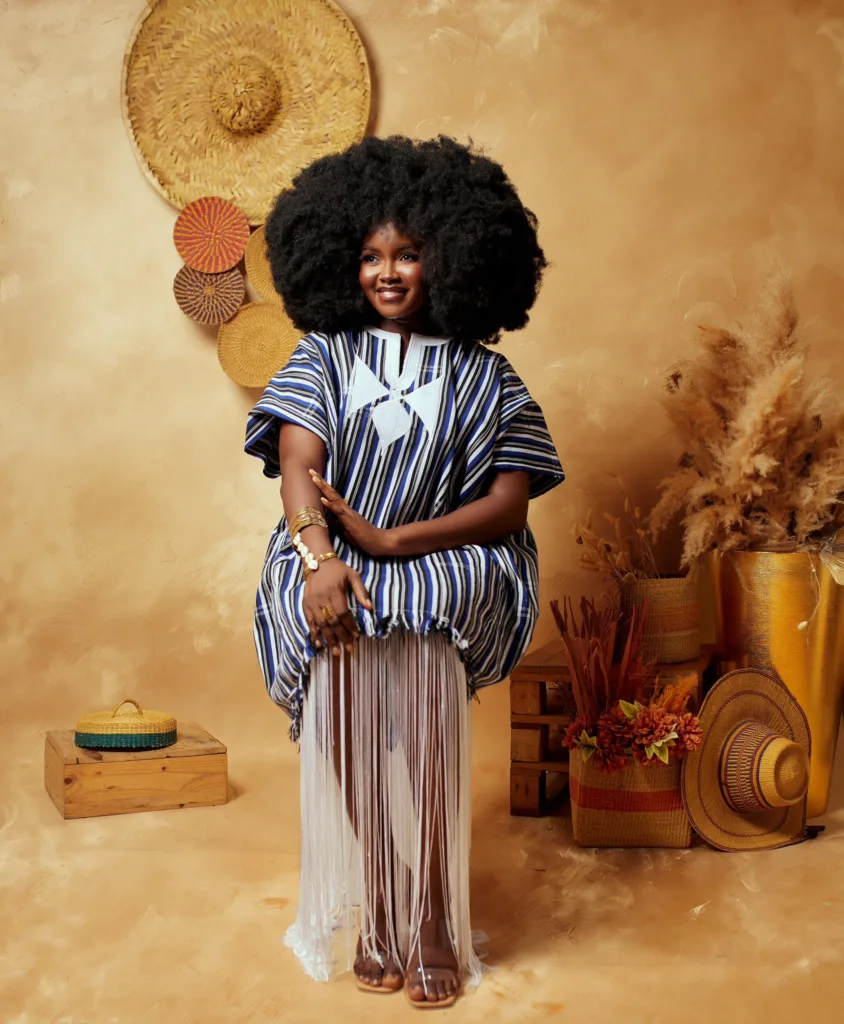
Her love affair with fashion began as a teenager when she was captivated by an avant-garde show that left an indelible mark on her creative spirit.
“I knew then that I wanted to design unforgettable pieces of garments that leave an impact long after they are worn,” she added.
Encouraged by her supportive parents, she pursued visual arts and textiles, laying the foundation for AVONSIGE, a brand that has since become synonymous with elegance, cultural appreciation, and innovation.
She explains that, AVONSIGE is not just about garments, but rather a gateway into Ghanaian culture, with a signature aesthetic that merges pristine whites with rich indigenous textiles.
Again, she said that people have to see Ghanaian smock and kente, fabric and wear them with pride, knowing that each weave carries centuries of history.
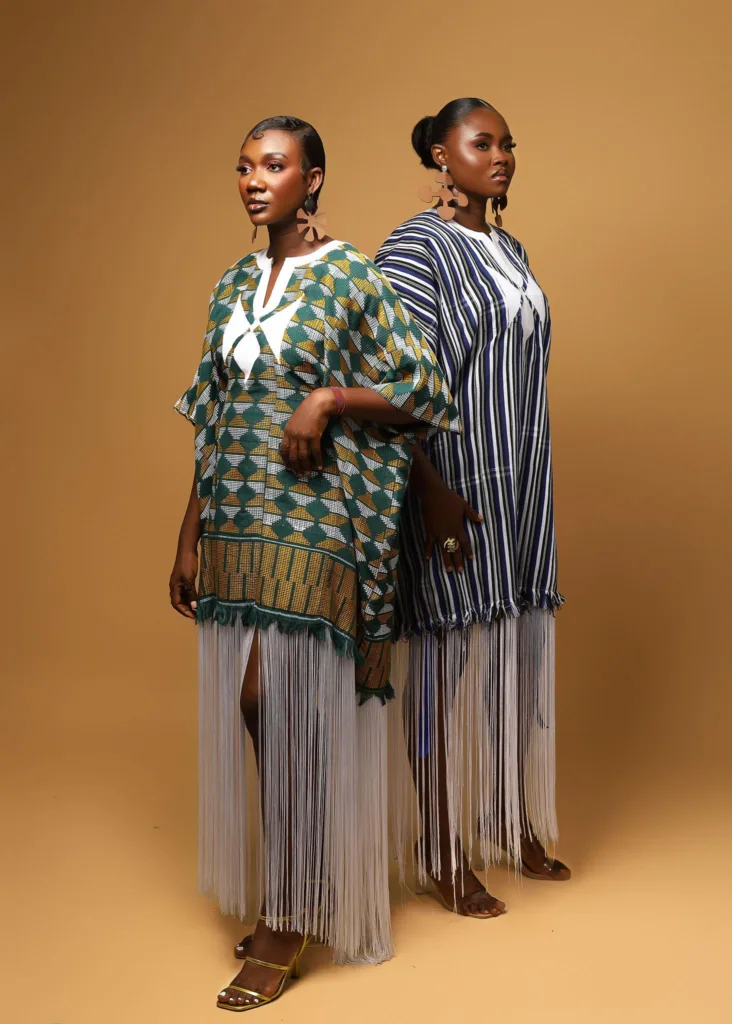
She beams as she described her mission of creating a safe space to understand and appreciate the Ghanaian lifestyle and traditions as the country celebrate Ghanaian heritage month.
Fashion should be a conversation starter, a way to carry our history with us. When you wear AVONSIGE, you are not just wearing fabric; you are wearing the soul of Ghana.”
She paused, then added, “To know our attire is to know our worth.”
Avonsige takes immense pride in sourcing authentic fabrics from the Upper East Region of Ghana. “Our styles and textiles are deeply rooted in the craftsmanship of northern Ghana,” she told me. “From the intricate handwoven smocks to the vibrant kente, each fabric carries the legacy of our ancestors, and we ensure that authenticity is preserved in every piece,” she indicated.
Avonsige’s passion for storytelling is evident in every project she undertakes. “I wanted to push beyond the runway,” she said, eyes alight with excitement.
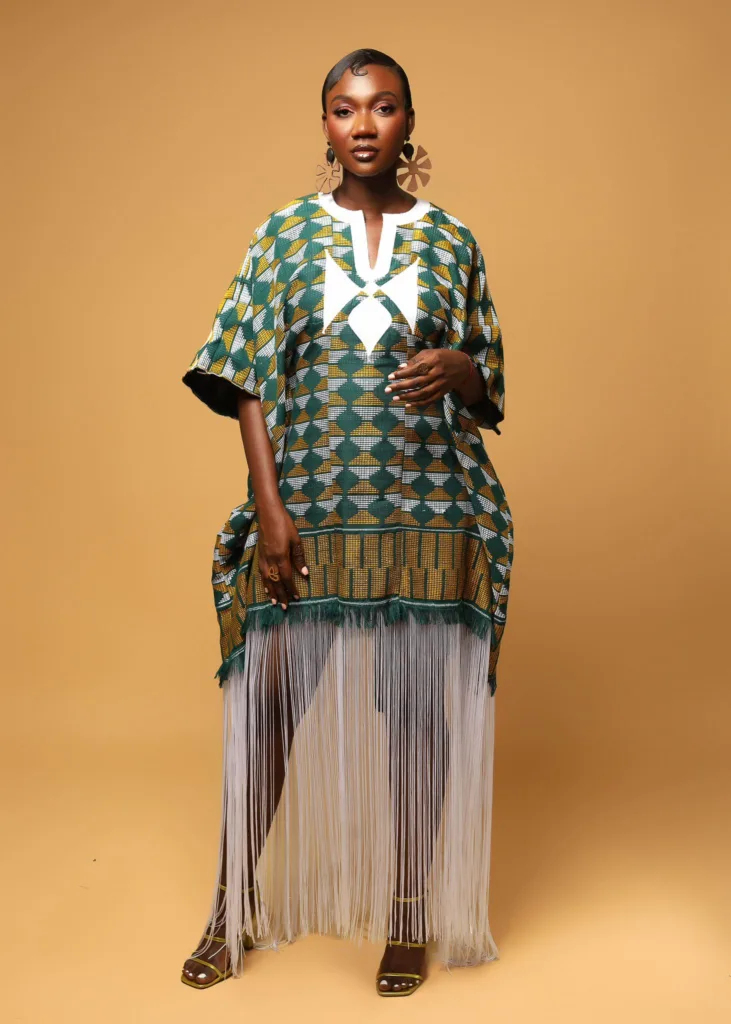
Her commitment to preserving Ghanaian narratives through fashion is unwavering. “Every stitch, every pattern has meaning,” she noted. “That’s the beauty of our craft – it is a living, breathing testament to who we are.”
Beyond luxury and aesthetics, AVONSIGE is deeply rooted in philanthropy. “Fashion should not only inspire but also uplift,” she tells me. Through her annual initiative, AVONSIGE Runway for a Cause, she recreated original designs into Christmas outfits for orphans and underprivileged children in northern Ghana.
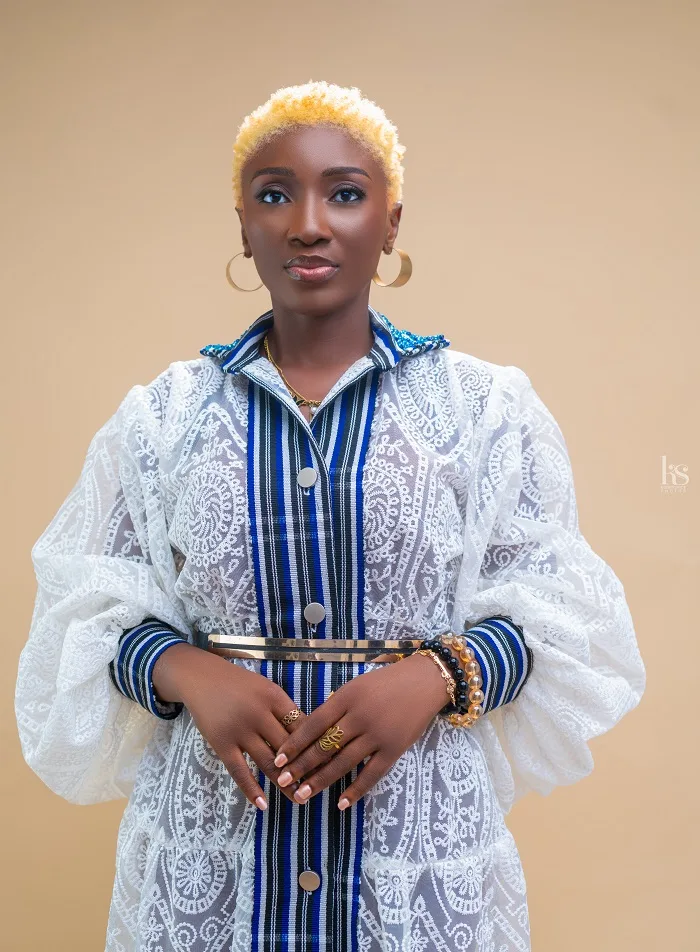
“This is something very close to my heart,” she said with a softening voice. “It is my way of giving back, of ensuring that every child feels valued and beautiful.”
As our conversation draws to a close, Avonsige leaves me with a profound thought: “Fashion is not just about what we wear – it is about the stories we carry, the heritage we embrace, and the future we envision.”
Through her passion, creativity, and unwavering dedication, Avonsige Ayinemi Augustina has turned AVONSIGE into more than just a brand. It is a movement, a celebration of culture, elegance, and purpose.
Join her on this extraordinary journey where fashion is more than a trend, it is a lifestyle, a cultural bridge, and a force for change.
By Geoffrey Buta
News
Who wears the crown? …as 13 contestants mount stage in 2025 Miss Ghana Beauty Pageant tonight

Thirteen young and vibrant ladies selected across the regions of Ghana will vie for the prestigious 2025 Miss Ghana Beauty Pageant crown as the event is held today at the Avenue Event Center in Accra.













Each contestant will rep¬resent their respective regions as they compete for the prestigious crown.
The contestants have gone through the weekly tasks ahead of the highly anticipated grand finale.
According to the organisers, this year’s winner will not only represent Ghana on the global stage at Miss World but also lead charitable initiatives under the Miss Ghana Foundation, focusing on support¬ing vulnerable communities.
Below are briefs about the contestants.

Deborah Fidelia Naa Ayeley
Deborah Fidelia Naa Ayeley, is a 25- year old Christian and hails from the Greater Accra Region. She loves watching movies, reading, listening to music and volunteering.

Nana Adjoa Enninful
Nana Adjoa is an 18-year old lady shaped by the values and culture of her hometown, Winneba in the Central Region. My hobbies include playing basketball, engaging in arts and listening to music.
These activities do not only provide entertainment but also contribute to her
Nutornutsi Priscilla Megblemdio

Nutornutsi Priscilla Megblemdio is a 22-year old from Tadzewu in the Volta Region of Ghana.
She is a proud fashion designer and a model who loves cooking, listening to music and watching movies. She finds passion in team work and always learns something new.

Priscilla Ayeley Kwablah
Priscilla Ayeley Kwablah 23, is a Christian
who loves reading and listening to
music representing the Western North
Region of Ghana.
She believes every lady should be
determined and have the zeal to attain
every height in life.

Stella Afua Sakaa Sak
Stella Afua Sakaa Sak is a graduate of the University of Education, Winneba. She is representing the Western Region proudly.
She is a teacher by profession and an entrepreneur who loves to model and paint in her free time.

Thelma Dzifa Sallah
Thelma is a 22-year old spoken word artist
and a student of the Kwame Nkrumah University of Science and Technology (KNUST).
She hails from the Upper West Region of Ghana.
Her hobbies are reading and writing and
listening to good music.
The Miss Ghana project has always been a
dream she harboured since she was a little
girl but growing up, she realised it is not
just about the crown, the glitter and the
sash.
She now sees the crown as a symbol of
change in the lives of not only the ladies
participating but also a change in the lives
of the marginalised group of people in the
country.

Theresa Weyerane Adiali
Theresa Weyerane Adiali, 28, is a journalist with the Media Foundation for West Africa as an Investigative Journalism Fellow with a background in communication, and a passion for impactful storytelling.
Theresa has been a force in driving change for the marginalised communities
through humanitarian work with
UNICEF Ghana, and as a radio and TV news broadcaster.
Theresa envisions Miss Ghana as a platform to empower rural women and children in climate displaced communities in Ghana.

Angelina Elikplim Quason-Coffie
Angelina Elikplim Quason-Coffie is a final year student Physician Assistant.
Crocheting and reading are the hobbies she enjoy. Combining beauty, intellect and a deep commitment to societal impact, she aims to use the platform to advocate better
healthcare and welfare of aged men and women.
Her project focuses on improving access to quality healthcare while providing essential support and care for the elderly in communities.

Emmanuella Kudjordji
Emmanuella Kudjordji is a 24-year old professional teacher and a model from Denu in the Volta Region of Ghana.
She loves to promote girls education hence, her project titled, ‘Empowering girls, empowering the nation.’
She loves to model, listen to music and dance.

Jutta Ama Pokuah Addo
Jutta Ama Pokuah Addo is a 20-yearold
Christian from the Central Region
who loves golf and painting.
She is a dual student at the University
of Professional Studies, Accra and Wisconsin International University.
She sees herself as a young woman
with a bold spirit with a bright future
ahead of her.

Maud-Gail Cindy Nuworgah
Maud-Gail Cindy Nuworgah is a proud Voltarian and recently graduated from the University of Cape Coast, where she developed
a strong foundation in her chosen field of study.
Driven by a passion for self-improvement and community impact, she aims to use her
skills and experiences to contribute positively to society.
She values hard work, resilience, and cultural pride, to shape her outlook on life and aspirations.

Oduro Maud Anti
Oduro Maud Anti is honoured to represent the Ashanti Region as a delegate for Miss Ghana 2025.
She is a 22-year-old student of the Krobo Girls’ Senior High School who progressed to read Bsc. Information Technology at the
University of Ghana.
She is passionate about mental health awareness and girls’ education and aspires to inspire young girls to dream big and
pursue their goals with determination. She is driven by Ghana’s rich culture and resilience.

Melissa Mintah
Melissa Mintah is a 26 years old graduate from the Central University. She is an ambitious young woman pursuing a dream to become a lawyer.
With a passion for justice and a heart for advocacy, she balances her rigorous studies in law with grace and poise on the pageant stage.
Her dedication to education is matched by a commitment to empower others, using the platform to promote important social causes and ending poverty.
In addition to her academic and pageant
pursuits, she loves to cook and find
joy in creating delicious meals for family
and friends.
-

 News1 week ago
News1 week agoDeclaration of Monday, 31st March 2025 and Tuesday, 1st April 2025 as Public Holidays
-
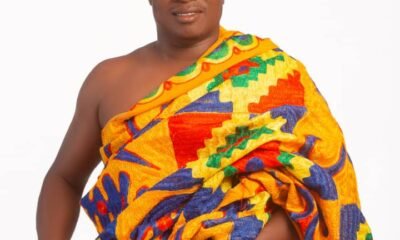
 News4 days ago
News4 days agoGodfred Agbeteti is best suited to lead Kpando Municipal Assembly – Assemblyman
-

 News1 week ago
News1 week agoGEXIM CEO calls for accelerated empowerment of women in Agribusiness for Africa’s economic growth

